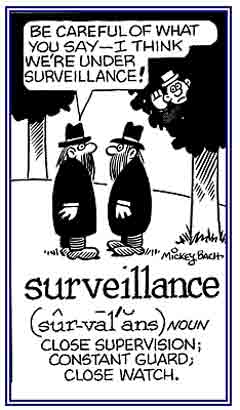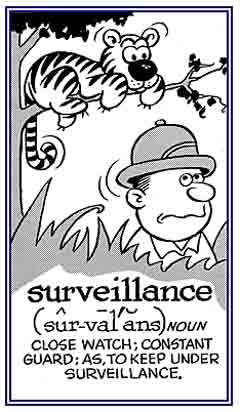2. The act of keeping a careful eye someone or something in order to detect or to prevent any kind of felonious act or to provide evidence of such actions: The surveillances provided by the bank's video cameras helped to identify the bank robbers.
Electronic surveillances are being utilized by more cities around the world in order to apprehend lawbreakers who are involved in illegal activities.
3. Etymology: from French surveillance, "oversight, supervision, a watch"; a noun of action from surveiller, "oversee, watch"; from sur-, "over" + veiller, "to watch" from Latin vigilare, from vigil, "watchful, awake, wakeful".


Go to this Word A Day Revisited Index
so you can see more of Mickey Bach's cartoons.
When someone passes a gate, or door, of a place holding an item with an electronic article surveillance that hasn't been turned off, an alarm sounds.
Corporations use electronic surveillance to maintain the security of their buildings and grounds.
Electronic surveillance permeates almost every aspect of life in the United States; for example, in the public sector, the president, Congress, judiciary, military, and law enforcement all use some form of this technology.
In the private sector, business competitors, convenience stores, shopping centers, apartment buildings, parking facilities, hospitals, banks, employers, and even spouses have utilized various methods of electronic surveillances.
- Improvement of security for people and property.
- Detection or prevention of criminal, wrongful, or illegal activities.
- The interception, protection, or the obtaining of valuable, useful, scandalous, or embarrassing information about a person or numerous people.
Electronic eavesdropping or electronic surveillances have several objectives:
